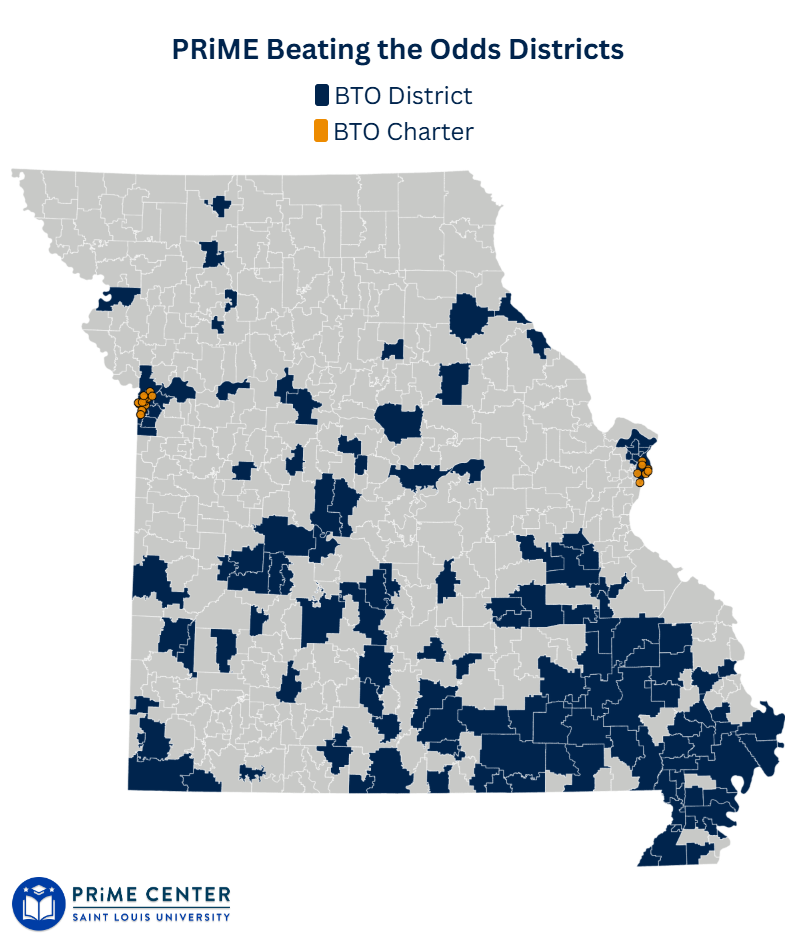EDUCATION REPORTS
in-depth explorations of education topics
Education reports are larger research projects, often evaluating programs and highlighting the results. Here you'll find in-depth description of the data being collected, methods of analysis, previous findings from similar research, and extensive discussion of the results.
We strive to put results in context and understand how they affect Missouri schools and students.
The Saint Louis University (SLU) Billiken Teacher Corps (BTC) offers two pathways for current and aspiring Catholic school educators to earn their Master of Arts in Teaching (MAT) and certification (if needed): Cura Community and MAT Magis.
This report examines the effect integration had on the Black teacher workforce in Missouri from 1954–1970. We outline how Black teachers were displaced in the seventeen southern and border states as these states moved toward compliance with Brown. We present data on the displacement of Black teachers in these seventeen states—with a focus on Missouri. Our report concludes with an analysis of trends in the student-teacher racial parity index in Missouri and implications for policymakers about how this history connects to the contemporary status of student-teacher demographics in Missouri public schools.
Abstract: When looking at the actual impact that schools are having on student learning, it is vital to look at student growth. This is especially important for schools that enroll high percentages of low-income students. Opposite of growth are single point-in-time measures such as proficiency, which do not adjust for where students start the year. Missouri has the best growth model in the country. This report combines three years of growth data, and then looks at the quartile of Missouri schools enrolling the highest percentage of low-income students. The data show that some of the highest growth schools in Missouri also enroll some of the highest percentages of low-income students. Recognizing, rewarding and replicating the successes of these schools is the best path to improving outcomes for the state’s most vulnerable students.
This 1st Edition of PRiME’s Missouri Three Year Statewide Growth Report which covers data from the 2021-22 and 2023-24 school years.
When we talk about how students are doing in subjects like reading and math, it’s more helpful to look at how much they grow over time rather than just where they stand at one moment. This report continues the PRiME Center’s efforts to highlight Missouri’s excellent schools by examining student growth in the state's most rural schools over the last three years.
Mentoring of early-career teachers is a key strategy used by the Missouri Department of Elementary and Secondary Education (MO DESE) to improve teacher retention. To that end, MO DESE needs better information on the features of mentoring that early-career teachers receive and the features that may be related to teacher retention. At the request of MO DESE, the Regional Educational Laboratory Central conducted a study of the frequency, duration, activities, and topics addressed in the mentoring received by first-year teachers in Missouri who registered for state-delivered teacher induction workshops in the 2022/23 school year. The study also sought to identify which mentoring features were related to teachers’ likelihood of returning to teach in the same school district for a second year, as measured by teacher employment records.
The number of people in Missouri without stable housing is rising; this includes families, children and youth. The McKinney-Vento Homeless Assistance Act–initially established in 1987–requires schools to collect data on and provide support for students facing homelessness. However, little is known about the extent of students and families experiencing homelessness, the policies and programs that support these vulnerable students or their schooling opportunities and outcomes. In this report, I describe the McKinney-Vento Homeless Assistance Act, describe recent homelessness trends, provide an overview of McKinney-Vento participation and briefly describe outcomes for students supported through McKinney-Vento programs across the state of Missouri. I conclude with a discussion of the importance of addressing homelessness in relation to student mobility.
Teacher mobility in Missouri and most states across the country reached long-term highs following the pandemic over the 2022-23 school year. Though mobility declined in 2023-24, several worrying trends have persisted across the state, including higher turnover among teachers working in urban, rural, and disproportionately low-income schools. Turnover is also disproportionately high among the state’s teachers of color, though the state has more than doubled the recruitment of new teachers of color over the past decade. As legislators and education leaders work to support Missouri’s teacher workforce, policy formation must engage with labor conditions specific to particular school and teacher characteristics to effectively improve outcomes for teachers and the students they educate.
In June 2020, Saint Louis University launched the SLU/YouGov poll to provide researchers and policymakers with an assessment of Missouri likely voters’ opinions on relevant political and educational issues. Some questions were asked in multiple polls to monitor trends over time, while others were relevant to potential policy changes that may have impacted the education sector at a given time. Here, we summarize the findings from nine polls conducted from 2020–2025 to identify trends in public opinion on Missouri’s education issues.










This PRiMER on Missouri public school funding explains revenue sources, trends, formula mechanics, district expenditures, protections against enrollment decline, and fiscal reserves to provide a clear foundation for understanding Missouri’s school finance system. Over time, average per-pupil funding has risen substantially in real terms, though Missouri remains below the national average while aligning more closely with its neighboring states. Despite this equalization mechanism, wide variation in spending exists across districts, with evidence suggesting some regressive elements that benefit wealthier areas.